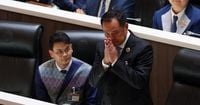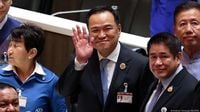Thailand’s political landscape has taken a dramatic turn as Anutin Charnvirakul, leader of the Bhumjaithai Party, was elected Prime Minister on September 5, 2025. After months of political turbulence, marked by coalition breakdowns, legal wrangling, and the abrupt departure of a former prime minister, Anutin’s rise signals both a moment of respite and the onset of new uncertainties for the Southeast Asian nation.
The 58-year-old tycoon-turned-politician clinched the premiership with 311 votes out of 492 lawmakers present in the National Assembly’s lower house, as reported by Reuters and TIME. His victory came just a week after the Constitutional Court removed Paetongtarn Shinawatra—daughter of the influential former Prime Minister Thaksin Shinawatra—from office over an ethics violation linked to a controversial conversation with Cambodian leader Hun Sen. This court decision marked the sixth time a Shinawatra-aligned prime minister has been ousted by either the military or judiciary since 2006, according to The Guardian.
Anutin’s ascent was anything but straightforward. For years, he has been a fixture in Thai politics, serving as interior minister under the Pheu Thai-led coalition until June 2025 and as health minister in the preceding military-backed government. He is also a former deputy prime minister, and as TIME notes, his party Bhumjaithai—whose name means “proud to be Thai”—has become a mainstay in coalition governments, adeptly navigating the country’s perennial power struggles.
The final push to the top job came after a more than two-hour parliamentary debate, where Anutin defeated Pheu Thai’s last eligible candidate, Chaikasem Nitisiri. But the real clincher was a deal struck with the progressive opposition People’s Party, formerly the Move Forward Party, which had been sidelined from government despite winning the most votes in the 2023 election. In exchange for the People’s Party’s backing, Anutin committed to dissolving parliament within four months—effectively promising an early general election. The People’s Party, which controls nearly a third of the lower house, has chosen to remain in opposition, leaving Anutin to lead a minority government, a position that could make policymaking a tightrope act.
“I will work my hardest, every day, no holidays, because there is not a lot of time,” Anutin told a throng of reporters as he exited the parliament chamber, his face illuminated by camera flashes (Reuters). It’s a sentiment that underscores both the urgency and fragility of his tenure. If he honors the agreement with the People’s Party, his premiership could be one of the shortest in Thai history. Yet, as analysts warn, political deals in Thailand are often fluid, and Anutin, known as a shrewd dealmaker, may yet try to consolidate a new coalition to extend his grip on power.
So, what does Anutin stand for? The new prime minister’s portfolio is eclectic. He is a staunch royalist and conservative, having received honors from the palace, and his party is known for its unwavering support of Thailand’s strict lese majesty law—a statute that carries up to 15 years in prison for criticism of the monarchy. “In a country where symbols hold immense significance, it is not a stretch to interpret this as the anointing of a new conservative successor,” wrote Napon Jatusripitak, a visiting fellow at the ISEAS – Yusof Ishak Institute, in The Guardian.
Yet, Anutin is also known for championing the decriminalization of cannabis—a move that, while initially popular, has since generated controversy due to the rapid proliferation of marijuana shops and regulatory confusion. He insists his focus was always on medical cannabis, but the lack of initial safeguards caused unease among the public and uncertainty for small businesses. As health minister, he oversaw Thailand’s COVID-19 response, further raising his national profile.
On the economic front, Anutin inherits a country grappling with weak domestic consumption, tight lending, and soaring household debt. According to Reuters, Thailand’s economy has struggled to regain momentum, and the new government faces pressure to deliver tangible improvements. Some analysts, like Mark S. Cogan of Kansai Gaidai University, suggest that Anutin may pivot away from the populist policies of Pheu Thai—such as the much-touted digital wallet scheme—in favor of pragmatic infrastructure reforms and regional partnerships. Decentralization and increased authority for local governments may also be on the agenda, as Bhumjaithai has traditionally relied on local power brokers to maintain its political network.
One area unlikely to see change is the royal defamation law. Anutin’s royalist credentials suggest he will resist any attempts to reform or repeal the controversial statute, a position that has previously placed Bhumjaithai in opposition to more progressive parties.
The political drama is not confined to parliament. Looming over Anutin’s premiership is the shadow of Thaksin Shinawatra, the billionaire patriarch of Pheu Thai and father of the ousted Paetongtarn. On September 4, just hours before Anutin’s election, Thaksin abruptly left Thailand, officially for medical reasons, but his jet diverted to Dubai, where he previously lived in self-imposed exile. He later posted on social media that he would return to Thailand by September 8 to attend a Supreme Court hearing that could see him sent back to jail. Thaksin’s legal saga has been a recurring subplot in Thai politics: after being ousted in a 2006 coup, he spent years abroad, returned in 2023 to serve an eight-year sentence (later reduced to one year by royal pardon), and was controversially granted early release on medical grounds. The Supreme Court is now set to rule on whether his hospital stint counts as time served, a decision that could have significant ramifications for Pheu Thai’s future and, by extension, Anutin’s own political fortunes.
Meanwhile, the Pheu Thai party, once the juggernaut of Thai politics, finds itself in crisis. The party’s popularity among the working classes has eroded, and its leaders have been repeatedly sidelined by judicial interventions. Yet, in a statement after Anutin’s victory, the party vowed: “We will return to finish the job for all the Thai people.”
As for Anutin, he is not just a politician but a man of many interests. He is a licensed pilot who has used his private jets to deliver organs for transplant patients, a saxophonist, and a street food enthusiast. On social media, he’s been seen crooning at karaoke, playing 80s Thai pop, or cooking fried rice in shorts and a T-shirt. But beneath the everyman persona lies a canny political operator—one who has built Bhumjaithai into the main conservative force in parliament and now finds himself at the helm of a government facing both daunting challenges and fleeting opportunities.
Whether Anutin will keep his promise to call early elections remains to be seen. The coming months will test his ability to hold together a fragile coalition, manage economic headwinds, and navigate the ever-shifting allegiances that define Thai politics. For now, Thailand has a new prime minister, but the sense of uncertainty—and the possibility of another rapid change at the top—remains ever-present.


